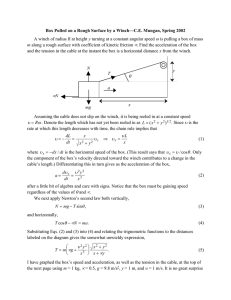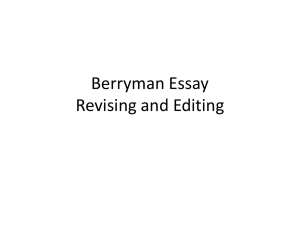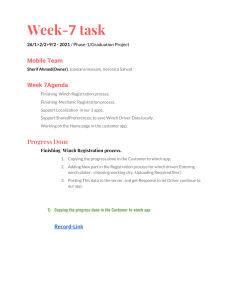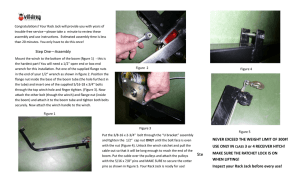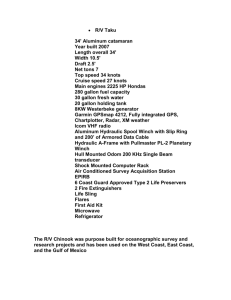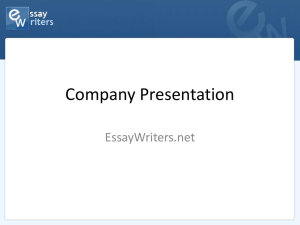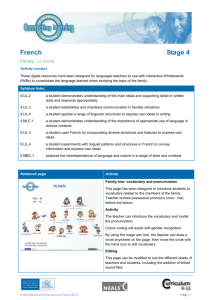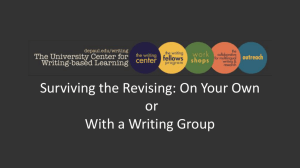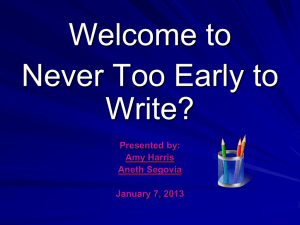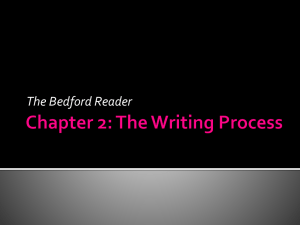EAL300_Writing
advertisement
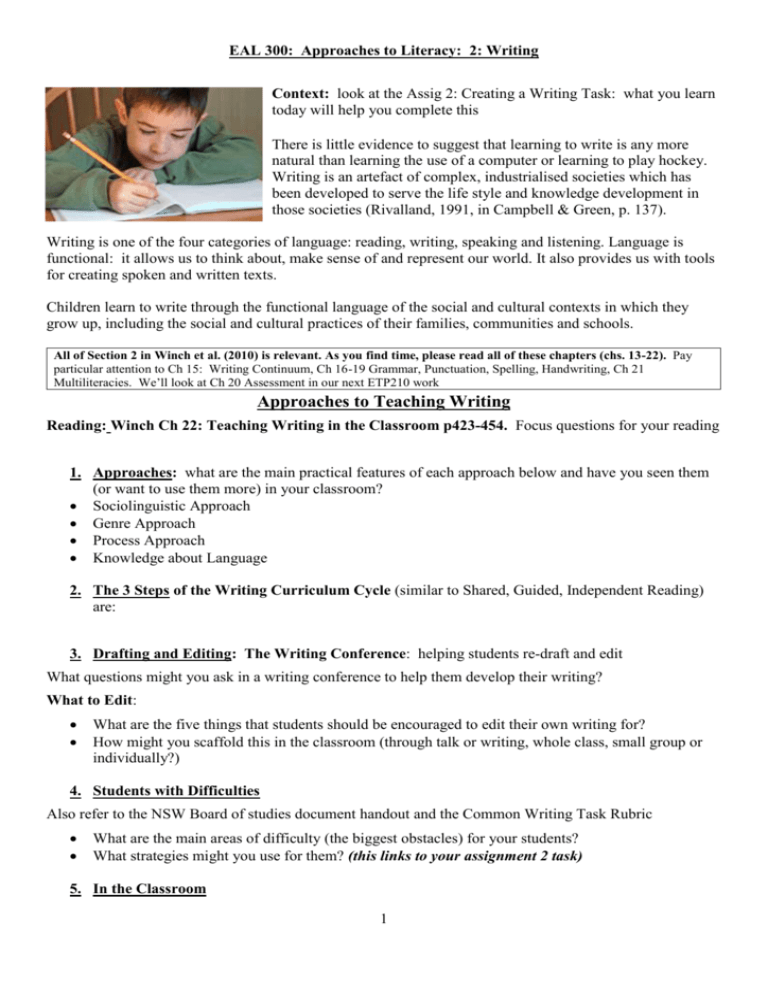
EAL 300: Approaches to Literacy: 2: Writing Context: look at the Assig 2: Creating a Writing Task: what you learn today will help you complete this There is little evidence to suggest that learning to write is any more natural than learning the use of a computer or learning to play hockey. Writing is an artefact of complex, industrialised societies which has been developed to serve the life style and knowledge development in those societies (Rivalland, 1991, in Campbell & Green, p. 137). Writing is one of the four categories of language: reading, writing, speaking and listening. Language is functional: it allows us to think about, make sense of and represent our world. It also provides us with tools for creating spoken and written texts. Children learn to write through the functional language of the social and cultural contexts in which they grow up, including the social and cultural practices of their families, communities and schools. All of Section 2 in Winch et al. (2010) is relevant. As you find time, please read all of these chapters (chs. 13-22). Pay particular attention to Ch 15: Writing Continuum, Ch 16-19 Grammar, Punctuation, Spelling, Handwriting, Ch 21 Multiliteracies. We’ll look at Ch 20 Assessment in our next ETP210 work Approaches to Teaching Writing Reading: Winch Ch 22: Teaching Writing in the Classroom p423-454. Focus questions for your reading 1. Approaches: what are the main practical features of each approach below and have you seen them (or want to use them more) in your classroom? Sociolinguistic Approach Genre Approach Process Approach Knowledge about Language 2. The 3 Steps of the Writing Curriculum Cycle (similar to Shared, Guided, Independent Reading) are: 3. Drafting and Editing: The Writing Conference: helping students re-draft and edit What questions might you ask in a writing conference to help them develop their writing? What to Edit: What are the five things that students should be encouraged to edit their own writing for? How might you scaffold this in the classroom (through talk or writing, whole class, small group or individually?) 4. Students with Difficulties Also refer to the NSW Board of studies document handout and the Common Writing Task Rubric What are the main areas of difficulty (the biggest obstacles) for your students? What strategies might you use for them? (this links to your assignment 2 task) 5. In the Classroom 1 Which of the ideas in the blue section is most appealing, might you use most effectively in your class? Supporting Children in all Stages of Writing Where are your students at? (See Ch 15 Winch for more info here) conventional writing role play writing experimental writing proficient writing early writing For students to develop proficient writing skills, it is essential they: have adequate time for writing, thinking, talking and sharing are not expected to satisfactorily complete their writing in their first attempt are regularly assisted to improve their writing establish a purpose for their writing have a prospective audience for their writing decide on a suitable format, style and genre conference with their teachers and peers and write in a rich language environment. Teachers must model and scaffold the process of writing and allow students time to practise their developing skills, constantly creating the links between the literacy strategies of reading, writing, speaking and listening. They need to help students use appropriate information such as: Successful authors usually write about things which they know about or are interested in Writers sometimes outline for themselves the things they do know about the topic they intend to write about. This helps them realise what they don t know and tells them what they need to find out. Writers may consult various sources to gain information Writers need to select characters appropriate to the setting and the plot Events need to be ordered in a logical sequence Writers add or delete information in order to make their meaning clear. Editing and publishing strategies Paragraphing Inserting new information Crossing out Cutting and pasting Using arrows Asterisks Using the margin Layout Publishing formats Use of illustrations Knowledge of the writing process Rehearsing Recalling experience Selecting information Imagining an experience Putting feelings into writing Deciding upon the main idea or ideas Spelling Editing Revising Reorganising Using effective opening sentences Concluding a piece decisively and satisfyingly Consulting others Being aware of audience. (Butler, A. & Turbill, J. Towards a Reading Writing Classroom, 1987, PETA ) 2 Which might you use in your Assignment 2 task? Language Experience Writing: Balloon Day Experience What is Language Experience? Children learn most effectively when they have an opportunity to gain insights by firsthand experiences, in a natural learning environment they observe, imitate, experiment and draw conclusions from ‘hands on’ experiences with involve the 5 senses. Language generated orally from these experiences is recorded either by the children or teacher. Since the writer communicates directly to the reader who has shared the same experience, the text produced is highly predictable and readable by the children. Advantages of Language Experience Draws on reader’s immediate experience and written in their own words Enriches and extends children’s experiences Develops vocabulary and motivates children to use language for a variety of purposes High predictability helps less capable readers and ESL learners Provides opportunities for modeling of reading and writing in front of children Children learn about their world and language at the same time. Allows more natural integration of listening, speaking, writing and reading Caters for individual differences and ensures success at all levels Draws multi-grade classes together in a common experience which can be extended through individual, group or whole class activities. Types of Language Experiences Planned usually linked to a theme or curriculum area or community event Visits within community (clinic, store, building site, art centre, pool) Experiences with community members (walks, food gathering, cooking) Visits outside community (reptile centre, town school, pool, Sydney) Visitors to community (ARMTOUR , photographers, etc) Special days, community or school related (sports day, confirmation) Special events, community or school Spontaneous Unplanned: may happen at home, on the way to school, during the course of a class activity. Children naturally want to share these. Exploit the situation by encouraging them to share their reactions and understandings 3 Erection of buildings Road construction or maintenance Weather: sudden storm or flooding or winds Fire Unexpected visitor Arrival of something new in community Objects brought to school (show and tell) Playground incident Weekend occurrence Classroom event related (Finke weekend) Making something following directions (e.g. kite, model, balloon racing) Watching videos or other things Production of art and craft items in school Examples of Planning Language Experiences: see separate sheets Creating a Multi-Modal Text Assignment: using your resources Assignment Sheet (other side of unit outline) This worksheet and associated resources Chapter 21 in Winch: esp p 400, 409, 416-417; Review of Writing Sessions: PowerPoint Scan Remote Schools Resources (Writing and Spelling) What will you do next??? Homework: a) Assignment 2: Brainstorm ideas and discuss them with your mentor about the multi-modal joint construction of the classroom story. Start making notes about the key things that will be a part of this learning activity. Use the lesson plan template or the Learning Management Questions to guide you and so you don’t leave anything out. b) Reflection on Writing: Write a reflection on today’s learning in the Reflection section of your Googlesite. Head it ‘Teaching Writing’ and cover at least two areas of interesting things, concerns you have (things you don’t yet understand, questions you want answered), inspiration, plans, key learning points 4
